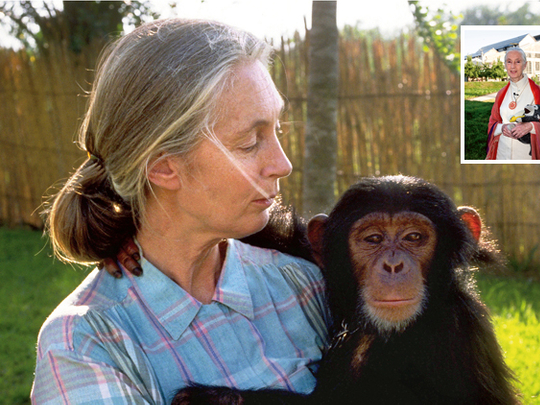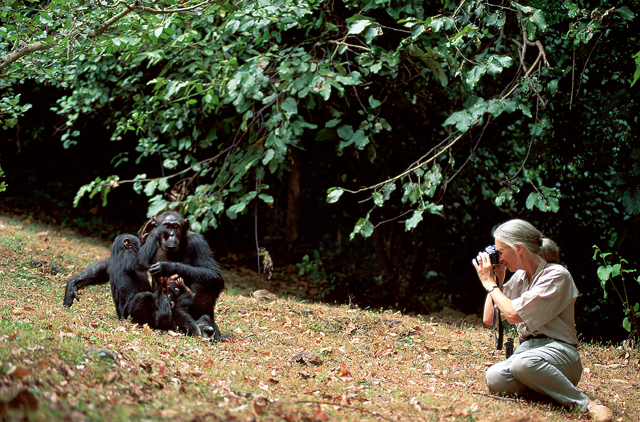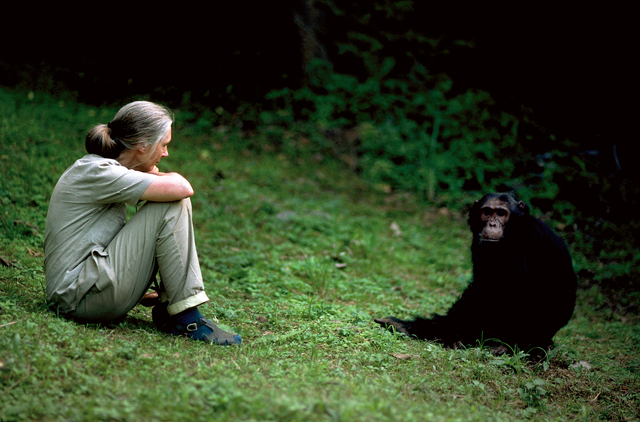
She loved Tarzan. And Dr Dolittle. In fact, Jane Goodall, the world’s foremost expert on chimpanzees, was so passionate a reader of these characters’ books that she once said, “I always knew I’d be a much better jungle companion for Tarzan than that other Jane.’’
And she probably would have been, having observed chimpanzees at close range for 52 years. It was Dame Jane – she was given the honour Dame Commander of the British Empire in 2003 – who broke new ground giving her subjects names such as Fifi and David Greybeard, and realising they had unique personalities, cliques and behaviour, much like humans – a very novel idea at the time.
“We have the choice to use the gift of our life to make the world a better place – or not to bother,” she once said, and this is no more true than in her life, which changed when she had the chance to visit Kenya in the 1960s.
There she met famed archaeologist and paleontologist Louis Leakey. Seeing her passion for wild animals he offered her a project which involved studying a group of chimps in Tanzania. Jane grabbed the offer and the rest, as they say, is history.
With diligent and painstakingly hard work Jane managed to open a window into their fascinating lives. Her observations of chimps in Gombe National Park challenged science and proved to the world that these animals could construct and use tools just like humans, and they were not vegetarians.
Jane, now 78, first fell in love with the creatures when she was given a life-like toy chimp called Jubilee by her father as a child and she still has the same passion for the wild and for saving chimps in Africa.
The Jane Goodall Institute, which the British primatologist set up, works to protect the famous chimpanzees at Gombe National Park and focuses on inspiring action on behalf of endangered species, particularly chimpanzees. The UN Messenger of Peace also encourages people to do their part to make the world a better place for people, animals and the environment we all share.
She spends over 300 days a year on the road travelling across the world promoting the message of protection and conservation of the chimp population but believes there is much more that needs to be done. “Chimpanzees are suffering horribly for our entertainment.... There’s still a lot that must be done to protect the animals,’’ she said recently when asked if she planned to take a holiday. She did, however, take a break of sorts from the rainforests of Africa earlier this year to promote Chimpanzee, the latest documentary from Disneynature.
Narrated by Tim Allen, the voice of Toy Story’s Buzz Lightyear, Chimpanzee follows the story of Oscar, a young chimpanzee living in the Tai Forest National Park, Ivory Coast. In the film, a rival band of chimpanzees confronts Oscar and his family, separating them. Left to fend for himself, Oscar meets Freddy, an alpha-male chimp that becomes an adoptive father.
Four years in the making, Chimpanzee is the fifth documentary produced by Disneynature. The softly-spoken Jane, who jokingly calls herself the “chimp lady” and still has Jubilee, the toy chimp, on a dresser at home, says the film will bring much-needed exposure to the plight of chimpanzees.
Jane, whose husband Derek Bryceson – a former member of the Tanzanian parliament and director of Tanzania’s National Parks – died in 1980 following a battle with cancer, has a son and three grandchildren. She took some time off from her schedule to give an interview for Friday:
Are there enough efforts being made to protect chimpanzees?
Well, when I began my study in 1960, there was no problem. There was no threat to the chimpanzees. There were way more than a million of them in the wild. But gradually, as human populations grew, the forest has been nibbled at around the side, the habitats being gradually destroyed.
Then the logging companies came in. They opened up some of the great forests of the Congo Basin that resulted in roads. Along the roads came the hunters. So for the first time you got commercial hunting of wild animals for food. Very different from the subsistence hunting where you kill just to feed yourself and your family.
This is to sell for money. While no self-respecting hunter will kill a mother with a baby, these hunters will and leave orphans just like the orphan in the film [Chimpanzee]. We’re trying to protect them. But from more than a million we’ve now got not as many as 300,000 stretched over 21 countries. Many can’t survive into the future.
So they are very endangered. To protect them we have to save the forest, which will also save the gorillas and the little bonobos, the elephants and all the other animals that are being shot by hunters. It’s very hard work. We need funds, which is why it’s so good that Disneynature gave us a percentage of the first week’s box-office takings.
It’s the 35th anniversary of the Jane Goodall Institute this year. Is anything else planned to get people to help save the chimpanzees?
Well, I do lecture tours 300 days a year all over the world and I will be talking about it during the lectures. But we’re always working on bright ideas to raise awareness even more. This film’s going to help. That’s what so great about this movie – it’s more than a documentary, it’s got this amazing story.
The chimps are great, but how are they as pets? Do you think people should have them?
Absolutely not! Oscar’s cute but Oscar’s going to turn into Scar [the ‘villain’ in The Lion King]. That’s what people don’t realise. Even if you take a chimp as a pet, you have to remember that the chimp’s being taken away from his or her mother. It’s usually when they’re very tiny. That’s like taking a human baby away from its mother. There’s no difference.
To take a chimp into a human home means they never get a chance to learn how to be a chimp so they’ll never be accepted [when they are returned to the wild after they’re grown up]. There was a woman who was maimed when a pet chimp named Travis ripped off her face and hand in the US in February 2009. You don’t want a chimp as a pet. It’s cruel to the chimp and it’s cruel to the chimp’s mother…
What advice would you give to a child who wants to work with animals in conservation?
Well, of course I would encourage them to join our Roots & Shoots programme
(www.rootsandshoots.org/), which is now in 130 countries. It’s changing lives and it’s hands on. They can become a chimp guardian of one of our orphaned chimps. They get information about it and they can ask us questions. But I say to these children, what my mother said to me. If you really want something you have to work hard, you have to take advantage of opportunity. And you must never give up. These days, they can surf the web, look for opportunities and virtually visit different kinds of forests or plains or savannahs or wetlands and see where they really want to go.
What can people do to help conserve the chimpanzee population and their habitat?
Well anybody who joins the Jane Goodall Institute or one of the organisations that aims to protect the rainforest is helping. Don’t buy wood products that are from uncertified tropical timber. Also, recycle your cellphones because [most of them] have coltan in them and that’s mined deep in the Congo forest. Become a bit more aware.
But it’s not just saving chimps - it’s saving forests. We now know that the cheapest and most efficient way of slowing down global warming is to conserve, protect and restore forests, particularly tropical forests. So, the whole thing ties in together for our future. You keep hearing we haven’t inherited this planet from our parents. We’ve borrowed it from our children. But we haven’t. We’ve stolen it and we’re still stealing it. It’s about time we start trying to pay back.
Where do you call home these days?
Three hundred days a year on the road makes me feel airports, airplanes and hotels are my home. But actually, my sister Judith and I own the house that we grew up in, which is in the UK, on the South Coast. She actually lives in it with her family. I sort of visit in between trips.
Has your knowledge of primate behaviour guided your parenting?
I think a little bit. Because I learn from the chimpanzees that there are good mothers and bad mothers and [I realise] the tremendous advantage that a chimp has if he has a good mother who’s protective, but not overprotective, and affectionate, playful and patient but able to impose discipline. And above all, a supportive mother. And I was so lucky to have that sort of mother myself. So, I might have raised my child that way anyway. But I certainly thought about the chimps. One thing I did think when I watched them is I want to have fun with my baby just as the chimps do with theirs.
What was your initial reaction after seeing the film?
I was completely amazed because to have an infant adopted by an alpha male is totally unique. I think it’s happened maybe once before, but never filmed before. And to have something so rare happen while a film team is actually there, I mean it’s like a gift from nature. Extraordinary, very moving.
What would you like people to take away from the film?
I hope that people will have a feeling – a little feeling of what it’s like to be a chimpanzee deep in the forest. They’ll certainly get a feeling for the fact that each chimpanzee has his or her own personality, that there are these amazing life stories. That you get all the drama, the fun, the excitement, the sadness, just as we have in human communities. And enormous intelligence. You see young ones learning by imitating, just as ours do and then by trial and error. And I hope they come away realising that these are amazing beings and that they want to help us to protect them because they’re very endangered in the wild.
The making of Chimpanzee
Executive producer of Chimpanzee Don Hahn, who also produced Beauty and the Beast and The Lion King, faced real challenges making the new documentary. The crew, he says, dealt with snakes, spiders, cheetahs and ants throughout the shooting.
Chimps don’t follow scripts, he adds, so it may take an entire day to capture just 30 seconds of usable film. “We don’t entice them or make them do anything, so you have to wait for them,” Hahn says. Directors Alastair Fothergill and Mark Linfield say they knew that Chimpanzee would be a difficult documentary to shoot before filming began.
Both have shot nature documentaries in extreme conditions around the world, but working on location in Ivory Coast proved especially trying because of civil war, the “dark, thick rainforest” and the quickness of the chimpanzees. But Fothergill insists the time and effort it took to bring a close-up view of chimpanzees to the big screen was worth it.
“Chimpanzees, without a doubt, are the best animals on the planet,” he says. “They are breathtaking, wonderful, engaging animals.”













